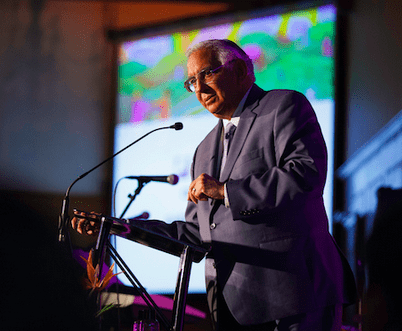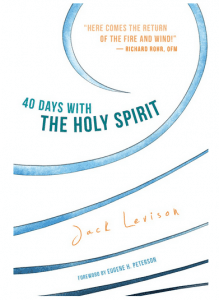 With a post last Thursday, Spirit or Scripture?, I began a series to explore the nature and action of the Holy Spirit in the Church and in the world. Although a focus on the Holy Spirit and gifts of the Holy Spirit may seem distinct from my more typical discussions of science and Christian faith, I think they are deeply intertwined. The nature of Scripture and the experienced reality of the supernatural lie at the very heart of many of our debates and disagreements.
With a post last Thursday, Spirit or Scripture?, I began a series to explore the nature and action of the Holy Spirit in the Church and in the world. Although a focus on the Holy Spirit and gifts of the Holy Spirit may seem distinct from my more typical discussions of science and Christian faith, I think they are deeply intertwined. The nature of Scripture and the experienced reality of the supernatural lie at the very heart of many of our debates and disagreements.
Within the scientific West the idea that there is more than the natural seems absurd – a myth we have outgrown.
Within the church there is a quest for authority. It seems far safer and more rational to trust in the Holy Authoritative Written Word of God as final authority than to trust in the ongoing work of the Spirit.
The view of Scripture as the Authoritative Foundation shapes the way the Bible is approached and used.
Recently a reader directed me toward a book, The Spirit in Creation and New Creation: Science and Theology in Western and Orthodox Realms, edited by Michael Welker. This book contains a series of articles by both Western and Orthodox Christian thinkers exploring the role of the Spirit. Many of these articles will form the initial basis for this series of discussions of the Spirit in creation.
 The first essay in The Spirit in Creation and New Creation is by the Rev. Dr. John Polkinghorne. As a scientist and an Anglican Priest and theologian Dr. Polkinghorne focuses primarily on nature and the analysis of “natural” processes. He repeats many of the ideas that he has expressed in earlier books including Quarks, Chaos & Christianity. Polkinghorne sees room for action of the Spirit in the intrinsic openness in creation resulting from quantum uncertainty and classical Chaos. The working of the Spirit is not opposed to nature, but within this openness.
The first essay in The Spirit in Creation and New Creation is by the Rev. Dr. John Polkinghorne. As a scientist and an Anglican Priest and theologian Dr. Polkinghorne focuses primarily on nature and the analysis of “natural” processes. He repeats many of the ideas that he has expressed in earlier books including Quarks, Chaos & Christianity. Polkinghorne sees room for action of the Spirit in the intrinsic openness in creation resulting from quantum uncertainty and classical Chaos. The working of the Spirit is not opposed to nature, but within this openness.
According to this picture, agency, whether human or divine, operates in regimes characterized by the cloudiness of inherent unpredictability, an insight that is in accord with the theological insight of the hidden character of much of the work of the Spirit. The processes of the world cannot be anaysed with complete clarity and decomposed into distinct and separate components, as if one could assert that nature did this, human agency did that, and the Spirit did a third thing. Causal powers are inextricably entangled. The working of the Spirit may be discernable by faith, but it can never be unambiguously demonstrated by experiment. The issue of the balance between what the Spirit does and what is the work of creatures is the familiar issue of grace and free will now written cosmically large. (p. 9 The Spirit in Creation and New Creation)
Dr. Polkinghorne concludes his essay reflecting on the role of the Spirit in scientific discovery, and by extension I would say all of human learning. He starts with John 14:16-17: “And I will ask the Father, and he will give you another advocate to help you and be with you forever— the Spirit of truth.” and 16:13 “But when he, the Spirit of truth, comes, he will guide you into all the truth.” In these passages the advocate is referred to as the Spirit of truth. For Polkinghorne this designation has importance in the church, and beyond the church as well. It has impact on all human endeavor.
We must, therefore, believe in the presence of the Spirit in all truth-seeking communities, including the community of science. The hidden character of the Spirit means that many of these communities, including scientists, will be unaware of His presence, but I believe that the Spirit has been at work, and God has been glorified, in all new acts of scientific discovery that reveal the wonderful order with which the universe has been endowed by its Creator. … The activity of science takes place within a community of mutually interacting seekers after truth and one of the gifts of the Spirit is koinonia, fellowship. The intellectual health of the scientific community depends upon the practice of virtues such as honesty in reporting results, generosity in sharing insights with others, and a just recognition of the achievements that individuals have attained. These are gifts that the Christian believes are ultimately enabled by the Spirit of truth. (p. 10)
We don’t want to take this too far. Clearly the motivations in the scientific community are not always governed by virtues such as honesty, generosity, and a just recognition. But the point is that as Christians we believe (or at least Polkinghorne believes) that human community in the pursuit of truth is ultimately powered by the Spirit – whatever the view of those members of the community – because the world as God’s creation is the ultimate foundation of reality. We should also note that the scientific community includes Christians and it always has. This is not a simple matter of them and us.
Within the community of Christians the Spirit of truth, forever with us, should certainly be a guiding light. The community of the church includes people who have studied a wide range of disciplines in the sciences including chemistry, physics, geology, biology, paleontology, neuroscience, and psychology. It includes those who have studied ancient Near Eastern cultures and languages, and who have deep expertise in the cultural context of the Bible. It includes those who have studies the Roman world of the first century and the early development of the church. The presence of the Spirit in the truth-seeking community of the church should be expected and embraced. It will manifest itself in all the gifts – including wisdom, knowledge, faith, prophecy, discernment, teaching, helping, guidance, as well as the more obviously supernatural gifts of prophecy (sometimes clearly supernatural – at other times less so), healing, miracles, speaking in tongues, and interpretation of tongues.
To embrace the Spirit in creation and in the church begins at a far deeper level that a “charismatic” style of worship – perhaps the reason why the Charismatic church has many of the same issues around Scripture and science that we find in other wings of conservative Protestantism.
What do you think of the passages in John where the Spirit is called a Spirit of truth?
What role does the Spirit play within the church? Beyond the church?
If you wish to contact me directly, you may do so at rjs4mail[at]att.net
If interested you can subscribe to a full text feed of my posts at Musings on Science and Theology.











